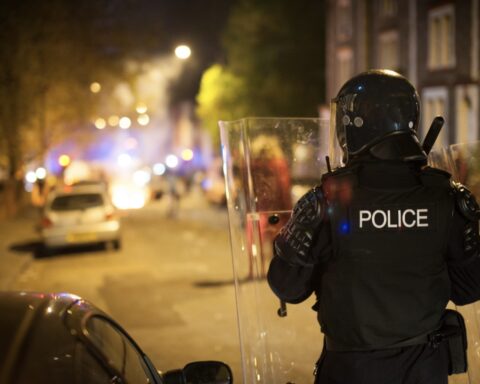The death of 18-year-old Fredy Villanueva, shot at the hands of police in Montreal North, inspired Fredy, a documentary play by Annabel Soutar about the 2008 shooting and the response from the local immigrant community.
The playwright set out to look at what happened from all sides and leaves audiences to reach their own conclusions about a story that provokes anything but indifference.
Const. Jean-Loup Lapointe shot Villaneuva during an altercation that started after police found Villaneuva and his group of friends playing an illegal game of dice. Villanueva’s death provoked a riot, stirred allegations of racial profiling and immersed the Villanueva family into legal battles with the Montreal police that lasted for years.
A coroner’s inquest was launched into Villanueva’s death. After a five-year wait, the coroner’s report came out in 2013 and says mistakes were made all around, but there was no foul play by the police.
The dynamics of power relations within the legal system and between the police, majority communities and immigrant communities are at the heart of Fredy.
The report left many unanswered questions about the circumstances and investigation surrounding Villaneuva’s death. Written by Annabel Soutar, Fredy was created as a space to look at these questions and encourage audiences to reflect on race relations.
Fredy plays in French at Théâtre La Licorne until March 26.
One of the play’s main themes is how Montreal immigrant communities believe they are targeted and treated unfairly by police. In 2011, a Quebec Human Rights Commission report backed these claims, calling out the systemic racial profiling and discrimination of racialized youth.
In the eight years following Villanueva’s death, reports on migration issues have made regular headlinesin Quebec. Last year, Quebec Human Rights Commission surveys raised red flags about religious intolerance, as well as ethnic and racial discrimination.
”I think Quebec should have a deeper conversation about how to integrate immigrants into our society, and if our institutions treat people equally and if we are indeed a racist society,” says Soutar, who was recently named one of Canada’s 2015 artists of the year.
A contentious play
The dynamics of power relations within the legal system and between the police, majority communities and immigrant communities are at the heart of Fredy.
Seven actors play multiple characters and cover five years’ worth of court transcripts and verbatim texts from judges, lawyers, police, media, hospital staff, family and the youth questioned by the police on the night of the shooting.
“We don’t really have access to the court, and all of a sudden to have access…to hear the facts, what was really said about this subject…I learned a lot of things,” says theatre-goer Yannick Chapdelaine.
What makes documentary theatre so powerful is the verbatim text, the voices of real people, as spoken in private interview or public record.
“The play you will never write already exists, it is in the memory of those who didn’t give you access.”
In Fredy, whose voices are actually heard remain a subject of contention. Notably absent is the voice of Fredy Villanueva. And, although his mother Lilian Villanueva collaborated early in the documentary process, she withdrew her support when she found out the playwright interviewed a police officer.
Theatre-goer Angel Mota thinks one of the strengths of the play is hearing many perspectives. “I was moved when the anonymous police officer said Fredy’s death also affected the police officers involved and their families,” says Mota.
“I do think that Fredy is a victim, but you have to prove it, and I think the play proves it very well,” he adds.
What stood out for Florence Blain was how the play brought out the human perspective, even on the police side because we tend “to put people into boxes right away; there is immediate judgement,” says Blain.
But Lilian Villaneuva is seeking justice for her son and, according to the play, questions the motives of the playwright to include the police perspective in her documentary.
“The play you will never write already exists, it is in the memory of those who didn’t give you access,” says Ricardo Lamour speaking as himself on stage. He is both an actor in the play and member of the family support committee, a citizen group created after Villaneuva’s death.
Lamour was also the person mandated to pull the plug on the support committee’s participation in the play. Soutar’s last minute efforts to reach out to Le comité de soutien à la famille Villanueva worked to restore trust and landed Lamour a role as the judge in Fredy.
Soutar’s choice to include the tension between the family and herself in the play acknowledges her self-described position of privilege writing about a poor immigrant neighbourhood in Montreal North.
“Things won’t change if we don’t change representation in Quebec, in the public sphere.”
Casting several actors in colour-blind, age-blind and gender-blind roles was another important theatrical decision that questioned assumptions about social roles.
“We had a vision that a black person should be able to play a white person, an old person should be able to play a young person and men should play women. In fact…sometimes you hear the language more clearly if you`re not thinking about the physical envelope of the person who’s speaking,” says Soutar.
Fredy’s legacy
Lamour wants theatre-goers to remember that “they (the police) killed this guy representing diversity, representing the new face of Quebec, this young bright man by the name of Fredy who was protecting his brother.”
“The support committee would like to see bolder action for social change. I think they remain skeptical about the theatre’s ability to provoke that change,” says Soutar.
“Prejudices about minorities killed Fredy Villaneuva,” says Mota. “Things won’t change if we don’t change representation in Quebec, in the public sphere.”
He wants the conversation to go beyond Théâtre La Licorne. “We need to start representing minorities in the movies in Quebec, in TV, in other plays,” says Mota.
Debates about Quebec’s lack of diversity on screen recently resurfaced during the Oscars whitewashing controversy.
“We need to…have a reflection on police, on its purpose and its inability to create wealth for our popular neighbourhoods; they actually kill it,” says Lamour.
The real litmus test will be to see what happens after Fredy closes.
Elvira Truglia is a Montreal-based journalist who writes about the intersections of culture, politics, and social issues. She has also worked in the community, media and cultural sector as well as national and international non-governmental organizations.





